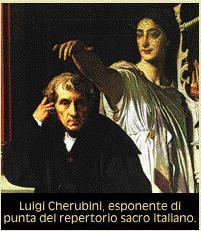

LUIGI CARLO ZENOBIO SALVATORE CHERUBINI
14thSeptember 1760 --- 15th March 1842
Copyright 1994-1998 Encyclopaedia Britannica
Last Updated on 2017
By Steven Ritchie
And now for the Music

(1117)"Requiem in C, Mov.1 Introitus". Sequenced by Koby Biller
(1118)"Requiem in C, Mov.2 Graduale". Sequenced by Koby Biller
(1119)"Requiem in C, Mov.5 Sanctus". Sequenced by Koby Biller
(1120)"Requiem in C, Mov.6 Pie Jesu". Sequenced by Koby Biller
(1121)"Requiem in C, Mov.7 Agnus Day". Sequenced by Koby Biller
(260)"Offertorium, Mov.4 of his Requien in C,(Info by Gary K Allen)". Sequenced by Koby Biller
(206)"Requiem in C Minor No.3". Sequenced by Stefan Lund

If you done any Classical pieces of say for example, Delius, mozart, and so on etc,
please email them to the classical music site with details to
"classical (@) ntlworld.com" written this way to stop spammers
just remove spaces and brackets for email address, thank you.

Visitors to this page --

Back to Classical Midi Main Menu click "HERE"